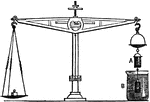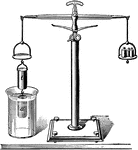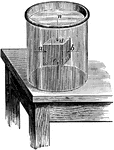Clipart tagged: ‘Principle’

Archimedes Principle
"States that: A body when immersed in a fluid loses exactly as much of its weight as is equal to the…

Archimedes Principle
"From on pan suspend a hollow cylinder of metal t, and below that a solid cylinder a of the same size…

Archimedies Principle
"It is evident that, when a solid is immersed in a fluid, it will displace exactly its own volume of…